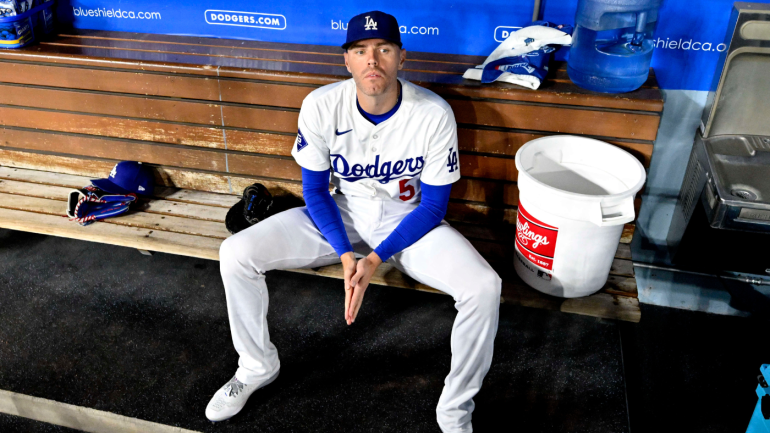
Brace yourselves, baseball fans. We're about to watch some extremely fun divisional series. But, inevitably, when a well-rested higher seed or two (or three ... or four?) is eliminated, there will be a talking about point about how it's no fair that teams have to sit around for five days without playing games and this postseason format rewards the lesser teams. The Dodgers, Phillies, Yankees and Guardians have been off this week as the wild-card round played out.
This argument really heated up last year when the 100-win Dodgers, 101-win Orioles and 104-win Braves were all sent home in the LDS round, combining to go 1-9 against lower seeds.
I generally hate complaints about playoff formats because it's just revisionist history based upon which teams advance. If it didn't go how you thought it should have, it must be a bad format, right?
The biggest problem with the current playoff format is it lets too many teams in the playoffs. The marathon that is the 162-game schedule lets us know quite well which teams are the top four or six or eight best, but we get to watch 12 teams make it now. Much of the complaining about the playoff format should center around this.
There was actually a study done by statisticians to see how many games each sport would need to play in order to get the better team winning 80% of the time, a clip around which the NBA has seen hit in the past. It was done in 2017, but the results are both hilarious and illustrative. Major League Baseball would need to play a best-of-75 series in order to make sure the better team wins even just 80% of the time.
It lines up. Think about how close some of these teams are through even 162 games!
We're all smart enough to realize that in a series of just five games, fluky things will happen with an inferior team advancing a pretty decent percentage of the time.
Instead, a recent development has been to latch onto the number of days off for the teams getting byes. The top two seeds in each league get five days off after the end of the regular season, while the other eight playoff teams battle it out in the best-of-three Wild Card Series.
Last season, three of the four bye teams lost in the divisional round. We've only had this format since the 2022 playoffs and the NL side hasn't seen a single bye team advance. Bye teams overall are 3-5 in divisional series, which happens immediately after the bye.
As such, we've seen far too much discussion about how the bye isn't fair to the teams that earned the bye. This is a sport that has a routine of playing just about every single day for six months and making a team sit around without playing a game is no fair, so the argument goes. Just look at the 2022 and 2023 Braves and Dodgers, right?
Here's where you lose me.
The Dodgers won Game 1 in 2022. If the problem was the lack of rhythm, shouldn't getting that Game 1 win out of the way put them back on track? The Braves in both 2022 and 2023 won Game 2 to even the series, 1-1. Again, the whole "rhythm" argument should be gone by then, right? The teams are back on even footing after the first two games of the series.
I understand that whenever an upset happens the playoffs in sports people search for answers. Why did this happen? When we start to see things pile up like the bye teams losing these series, it's only natural to blame the format. In order to get there, though, we have to overlook the real answer, though. It's the simplest one, so Occam fans can stand up.
It's small-sample baseball. Stuff happens.
That's it. This is the biggest argument for having a smaller playoff field, assuming the goal is to end up with the best teams in the World Series. The more playoff teams allowed in the tournament for a bunch of short series, the higher the chances are we'll end up seeing some of the titans bounced.
Let's circle back to the 2023 Braves. They were swept in Miami in three games in September and that wasn't after a long layoff. It was actually part of a stretch where they lost five of six games. Had that happened in the playoffs after a five-day layoff, the format would've been blamed. But it happened as part of the regular season, so everyone took it as "baseball happens." Let's just remain consistent and realize how this sport works in small samples.
And if you want some examples of teams who somehow -- by the grace of God!! -- survived layoffs before making a deep playoff run, here are some recent ones.
The 2019 Astros finished the regular season having won 12 of their final 14 games. They were on fire. Surely a layoff would crush them in this sport of routine where teams have to play every single day, right? They had four days off. Somehow, they managed to win the first two games in the ALDS and win the ALCS before losing in the World Series.
That wasn't a champ, though, so let's grab three champions.
The 2018 Red Sox were a stellar regular-season team, winning 108 games. They had to suffer with four days off before a playoff game. They were able to overcome that travesty and win their first playoff game. They did lose the second, though! Still, they went 11-3 overall in the playoffs in winning World Series in truly dominant fashion, never facing elimination.
The 2016 Cubs also had to deal with the indignity of four days off. They were able to win the first two games of the NLDS en route to winning the World Series.
The 2013 Red Sox were another team in the 10-team playoff format forced to take four days off. They also won their first two playoff games on their way to a World Series title.
OK, so those didn't happen in this current format. And they were all only four days off instead of five.
Surely the current format is the problem, then, right? Five must be the magic number. Teams still remember how to play baseball with only four days off, but that fifth day off is when things become dicey and they kind of forget how to play. Well, we've only had this format for two years, so it's difficult to spot a trend. And yet, one of those years yielded the 2022 Astros.
The 2022 Astros had five days off. They would steamroll through the AL side of the postseason, going 7-0 in the ALDS and ALCS combined before taking the World Series in six games. Again, after five days off, the Astros went 11-2 to win the World Series.
If we've only had this format for two years and one of those years included that Astros run, you're gonna be hard pressed to sell me on the bye being such a season-ruining problem for the teams receiving them.

















